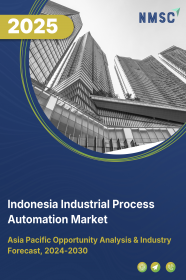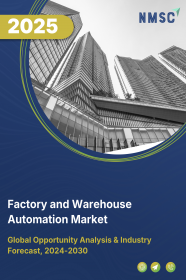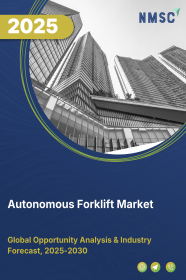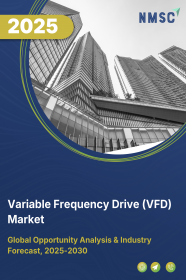
Indonesia Industrial Process Automation Market by Component (Manufacturing Execution System (MES), Distributed Control System (DCS), Programmable Logic Control (PLC), Supervisory Control & Data Acquisition (SCADA), Field Instruments, Industrial Robots, Human Machine Interface, Industrial PCS and Process Analyzers and Drives), and by End-User (Oil & Gas, Chemical & Refining, Energy & Power, Pulp & Paper, Metals & Mining, and Others)– Opportunity Analysis and Industry Forecast, 2024–2030
Industry: Semiconductor & Electronics | Publish Date: 28-Feb-2025 | No of Pages: 159 | No. of Tables: 121 | No. of Figures: 66 | Format: PDF | Report Code : SE999
Indonesia Industrial Process Automation Market Overview
Indonesia Industrial Process Automation Market size was valued at USD 548.6 million in 2023, and is predicted to reach USD 697.2 million by 2030, at a CAGR of 2.8% from 2024 to 2030.
The industrial process automation market refers to the industry that provides technologies and systems designed to monitor, control, and optimize industrial operations. It involves the integration of advanced computer technology, hardware, and software solutions to automate key processes such as inventory management, manufacturing, production, and quality control.
The key technologies include sensors, programmable logic controllers (PLCs), human-machine interfaces (HMIs), and supervisory control and data acquisition (SCADA) systems. This market serves industries such as oil and gas, chemical processing, food and beverage, and pharmaceuticals, where automation is crucial for improving operational efficiency, product quality, and workplace safety.
By reducing costs and minimizing human error, industrial process automation enables companies to streamline their production processes, ensuring higher output with greater precision. The demand for industrial process automation solutions continues to grow as businesses seek to enhance productivity and remain competitive in an increasingly automated global manufacturing environment.
Smart City Initiatives Boost Industrial Process Automation in Indonesia
The implementation of smart city programs and the government’s “100 Smart Cities Movement” by 2045 is driving a growing demand for automation and control systems in Indonesia’s energy sector. This trend is leading to increased adoption of industrial process automation solutions such as Programmable Logic Controllers (PLCs), Distributed Control Systems (DCS), and SCADA systems.
These technologies are essential for advancing smart transportation, power grids, and utility meters. As smart cities rely on advanced automation and digitization to improve productivity and efficiency, the demand for these solutions is expected to significantly accelerate the growth of the industrial process automation market.
Rising Industrial Sector Drives Industrial Process Automation Growth
The rapidly expanding industrial sector in Indonesia is a significant factor driving the Indonesia industrial process automation market growth. As industries such as manufacturing and energy continue to grow, there is an increasing demand for automation systems to enhance production efficiency, ensure consistent quality, and streamline operations.
The integration of technologies such as PLCs, DCS, and SCADA is essential for meeting these demands and improving overall productivity. Consequently, the expansion of Indonesia’s industrial sector is fueling the adoption of advanced automation solutions and contributing to the market's growth.
Lack of Standardization Hinders the Growth of Industrial Process Automation Market
The absence of standardization poses a significant challenge to the growth of the industrial process automation market. Without established standards, vendors may develop proprietary systems that are difficult to replace or upgrade.
This can lead to vendor lock-in, where companies become dependent on a specific vendor's technology, limiting their ability to switch vendors. Vendor lock-in can result in higher costs, reduced flexibility, and decreased innovation, that hinders market growth. Companies may be reluctant to invest in automation systems if they are concerned about being tied to a particular vendor, that further restrict market development.
Industry 4.0 Technologies Paving the Way for Future Automation Opportunities
The Indonesian government's "Creating Indonesia 4.0" Industrial Roadmap is designed to elevate the country’s position in industry 4.0 and is anticipated to significantly enhance the adoption of industrial process automation solutions. This roadmap promotes the use of technologies such as industrial sensors, industrial robots, and Distributed Control Systems (DCS) to boost efficiency, reduce costs, and improve safety in manufacturing and industrial processes.
By integrating these automation solutions, Indonesia aims to refine its manufacturing processes and supply chains, thereby increasing its competitiveness on the global stage. The roadmap presents a strategic opportunity for Indonesia to accelerate its adoption of industrial process automation and move towards becoming one of the world's leading economies by 2030, further driving the Indonesia industrial process automation market expansion.
Competitive Landscape
Several key players operating in Indonesia industrial process automation industry include Hitachi, Ltd., Siemens AG, Mitsubishi Electric Corporation, Schneider Electric SE, Honeywell International Inc, ABB Ltd., Toshiba Corporation, Emerson Electric Co., Rockwell Automation Inc., Omron Corporation, Fanuc Corporation, Valmet OYJ, Yokogawa Electric Corporation, Endress+Hauser, Fuji Electric Co., Ltd., and others.
Indonesia Industrial Process Automation Market Key Segments
By Component
-
Manufacturing Execution Systems (MES)
-
Hardware
-
Software
-
Services
-
-
Distributed Control Systems (DCS)
-
Hardware
-
Software
-
Services
-
-
Programmable Logic Control (PLC)
-
Hardware
-
Software
-
Services
-
-
Supervisory Control and Data Acquisition (SCADA)
-
Hardware
-
Software
-
Services
-
-
Field Instruments
-
Industrial Robots
-
Human Machine Interface
-
Industrial PCS
-
Process Analyzers & Drives
By End-User
-
Oil & Gas
-
Chemical & Refining
-
Energy & Power
-
Pulp & Paper
-
Metals & Mining
-
Pharmaceutical
-
Cement & Glass
-
Others
Key Players
-
Hitachi, Ltd.
-
Siemens AG
-
Mitsubishi Electric Corporation
-
Schneider Electric SE
-
Honeywell International Inc
-
ABB Ltd.
-
Toshiba Corporation
-
Emerson Electric Co.
-
Rockwell Automation Inc.
-
Omron Corporation
-
Fanuc Corporation
-
Valmet OYJ
-
Yokogawa Electric Corporation
-
Endress+Hauser
-
Fuji Electric Co., Ltd.
REPORT SCOPE AND SEGMENTATION:
|
Parameters |
Details |
|
Market Size in 2023 |
USD 548.6 Million |
|
Revenue Forecast in 2030 |
USD 697.2 Million |
|
Growth Rate |
CAGR of 2.8% from 2024 to 2030 |
|
Analysis Period |
2023–2030 |
|
Base Year Considered |
2023 |
|
Forecast Period |
2024–2030 |
|
Market Size Estimation |
Million (USD) |
|
Growth Factors |
|
|
Companies Profiled |
10 |
|
Market Share |
Available for 10 companies |
|
Customization Scope |
Free customization (equivalent up to 80 working hours of analysts) after purchase. Addition or alteration to country, regional, and segment scope. |
|
Pricing and Purchase Options |
Avail customized purchase options to meet your exact research needs. |

















 Speak to Our Analyst
Speak to Our Analyst



















